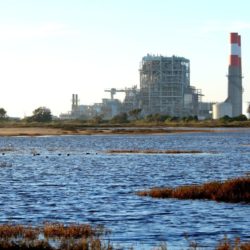An evaluation and recommendation by a California Energy Commission committee to reject a new natural gas peaker plant in Oxnard provides additional impetus towards the development of a safe, renewable energy system within the region.
On October 5, the two-person committee issued a statement recommending denial of the proposed 262-megawatt Puente Power Project in Oxnard on the grounds that the project would create significant unmitigable environmental impacts and conflicts with several existing laws, ordinances, regulations or standards. The committee also noted a September 29th letter from the California Independent System Operator (CAISO), affirming the technological feasibility of alternative preferred resources and programs such as solar/wind generation, energy storage, energy efficiency and demand response products and services. The City of Oxnard, the World Business Academy and several local environmental groups have been fighting the placement of a new peaker plant on the Oxnard beach and have presented evidence for years to show the proposed plant would harm Oxnard’s coastal wetlands and dunes, and degrade air quality.
Although the committee statement is a recommendation only, and the full five-member Energy Commission could still approve the plant in its final ruling, the issued statement and recommendation by the committee is being seen by opponents of the plant as a strong indication towards its ultimate denial.
“This decision presents an opportunity to create a strategic vision for supplanting the proposed Puente plant with renewable resources. Realization of this opportunity will entail continuous coordination among all interested parties and will require significant political pressure on our elected representatives and state regulatory agencies,” said Rinaldo S. Brutoco, World Business Academy president. He went on to observe, “California’s regulatory agencies are finally realizing that a clean energy future begins now, not tomorrow, so now is the time to act.”
World Business Academy Director of Energy Research Robert Perry added, “Although this decision opens the door towards a permanent energy solution, time is of the essence and citizens and elected officials for both Ventura and Santa Barbara counties must immediately start coordinating on developing commercially viable renewable energy solutions to replace these gas plants. Otherwise, it is entirely possible that a year from now, Southern California Edison will resubmit its proposals to the Energy Commission as the best available solution, and lacking an alternative, the Energy Commission could change its mind.”
In Oxnard, NRG Energy Inc. wants to replace two existing power plants there with the new Puente Power Project, a gas-fired power plant that the city of Oxnard, California Coastal Commission, the World Business Academy and other environmental groups oppose. The World Business Academy has been vigorously opposing the proposed Puente plant for several years on numerous grounds.
The committee’s recommendation follows a three-year fight by the City of Oxnard, local residents, the World Business Academy and other environmental advocates to block the new Puente power plant in hearings before both the California Public Utilities and Energy Commissions. A final ruling by the Energy Commission to reject the gas-fired Puente power plant would be yet another major decision showing that California’s legislature and regulatory agencies are re-evaluating the need for additional natural gas plants across the state and are seriously looking to transition the state towards a more distributed system based on renewable energy resources.
Only a week earlier, the California Public Utilities Commission rejected Southern California Edison’s proposed refurbishment of the aging Ellwood Peaker Plant in Goleta, a proposal fiercely opposed by the World Business Academy. In numerous filings and at public hearings, the Academy asserted that the refurbished plant during a transmission line failure would be forced to operate far beyond is permitted capacity, resulting in high particulate emissions adversely impacting adjacent, densely-populated neighborhoods, businesses and an elementary school for an indeterminate period of time (possibly months) until affected transmission lines/towers could be repaired. In addition, the California Legislature recently passed Senate Bill 338, which requires utilities to develop renewable energy alternatives to gas-fired generation in order to meet peak energy demands.

